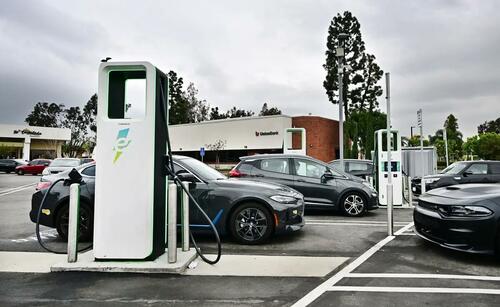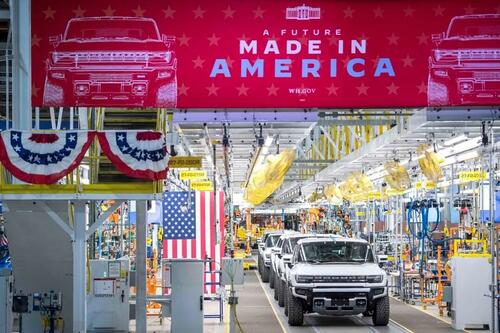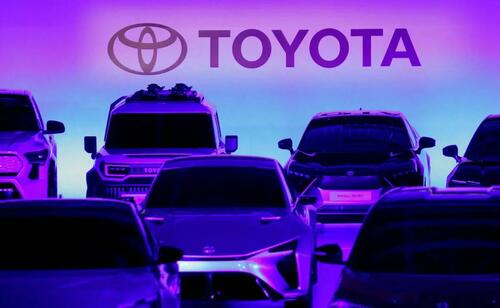.
Stephen Moore, senior economist at FreedomWorks and former senior economic adviser to President Donald Trump, has issued a grim prediction about America's electric vehicle (EV) market, saying EVs are poised to be automakers' "next big flop."
.
 Electric vehicles are charging at a charging station in Monterey Park, Calif., on April 12, 2023. (Frederic J. Brown/AFP via Getty Images)
Electric vehicles are charging at a charging station in Monterey Park, Calif., on April 12, 2023. (Frederic J. Brown/AFP via Getty Images)
Mr. Moore's grim prediction for the EV market came in an interview on Fox News's "Varney & Co." program on Oct. 30 and an op-ed in The Daily Caller on Oct. 29, in which the economist compared the current EV push to the failed rollout of the Ford Edsel.
"One of the textbook marketing flops of all time was the Ford Edsel sedan, which was heralded as the hot new car in the late 1950s," he wrote in the op-ed.
At the time of the Edsel launch, automotive experts widely expressed the view that the sedan—named after Henry Ford's son—would be a sure thing. However, instead of sales in the hundreds of thousands, as experts generally predicted at the time, the Edsel sold a paltry 10,000 or so units and was discontinued.
A key factor behind the Edsel's flop is, according to Mr. Moore, that the car was pushed on a public that didn't want it.
"The obvious lesson for the industry: you can’t bribe Americans to buy cars they don’t want. Given the all-in approach mentality for EVs at Ford and GM, it’s clear that Detroit never got this message," he wrote.
.
 A general view of GMC Hummer EVs is pictured at General Motors' Factory ZERO electric vehicle assembly plant in Detroit, Mich., on Nov. 17, 2021. (Nic Antaya/Getty Images)
A general view of GMC Hummer EVs is pictured at General Motors' Factory ZERO electric vehicle assembly plant in Detroit, Mich., on Nov. 17, 2021. (Nic Antaya/Getty Images) .
Even though the Biden administration has been pushing EVs on the public, including an offer of a $7,500 subsidy, less than 10 percent of all new car sales over the past two years were electric, according to a study published in early September by GOBankingRates. Most of that 10% was bought by corporation fleets
.
More recently, executives at General Motors, Ford, and Mercedes-Benz conceded, there is weakening demand for EVs, with some announcing they would pull back on their own EV production targets.
.
Mr. Moore says, waning EV demand is a signal that, aside from a relatively small fraction of early adopters of new technologies, private buyers on the whole are simply not that interested.
.
"The Edsel was one of the great flops of all time," Mr. Moore told Fox News in an interview. "I'm here to tell you, if these trends continue, we're going to see the EV market become the next big flop because private car buyers don't want them."
.
Market research firm Canalys estimates, global sales of EVs rose 49 percent in the first half of this year, down from last year's 63 percent pace of growth.
.
EV Demand
.
Speaking at an auto show in Japan last week, Toyota chairman and former CEO Akio Toyoda told reporters, waning EV demand is a sign people are waking up to the reality EVs are not the silver bullet against the supposed ills of carbon emissions they're often made out to be.
.
"People are finally seeing reality" about EV technology, Mr. Toyoda told reporters ahead of the Japan Mobility Show in Tokyo last week, speaking in his capacity as the head of the Japan Automobile Manufacturers Association, the organizer of the event.
.
Mr. Toyoda has been a long-time skeptic of a full-steam-ahead adoption of EVs.
He stepped down from his role as CEO of Toyota this year amid criticism that he wasn't serious enough about pushing the company into a quick adoption of battery-powered cars.
Mr. Toyoda's response to journalists who asked for his thoughts about falling EV demand, suggests he thinks he is vindicated in his reluctance.
.
"There are many ways to climb the mountain to achieve carbon neutrality," he said while implying, consumers are finally waking up from a dreamscape pushed by climate change alarmists that puts EVs on a pedestal and overhypes their benefits while downplaying their drawbacks.
.
His remarks came as demand growth for EVs in various markets has slowed, leading some companies to dial back their electrification plans.
.
 Toyota Motor Corp. cars are seen at a briefing on the company's strategies for battery EVs in Tokyo, on Dec. 14, 2021. (Kim Kyung-Hoon/Reuters)
Toyota Motor Corp. cars are seen at a briefing on the company's strategies for battery EVs in Tokyo, on Dec. 14, 2021. (Kim Kyung-Hoon/Reuters)
.
Honda and General Motors announced last week, they were scrapping a $5 billion plan to develop EVs together, while GM said, it was slowing its electrification strategy.
.
GM is "moderating the acceleration of EV production to 1) protect our pricing, 2) adjust to slower near-term growth in demand and 3) implement engineering changes to reduce losses," GM Chief Financial Officer Paul Jacobson said during an Oct. 24 earnings call with reporters in which he revealed that the weeks-long strike by unionized auto workers had already cost the company $800 million and counting.
.
Ford said earlier this month, it would temporarily cut one of three shifts at a plant building its electric F-150 Lightning pickup truck after slowing its EV ramp-up in July.
.
More recently, Ford CEO Jim Farley said in an earnings call with investors last week, the situation with EVs has been "challenging."
.
"Matter of fact, our business is never short of challenges, especially right now with the evolution of the EV market and new global competitors from China, as well as the technology disruptions," he said. "A great product is not enough in the EV business anymore," he said, adding that "we have to be totally competitive on cost" because "affordability is an issue" for consumers.
.
As a result, Ford has suspended $12 billion in EV spending on manufacturing capacity.
.
"Given the dynamic EV environment, we are being judicious about our production and adjusting future capacity to better match market demand," said Ford CFO John Lawler on Thursday.
"All told, we have pushed about $12 billion of EV spend, which includes capex, direct investment, and expense," he added.
.
While Mr. Toyoda argued at the Japan auto show that people were becoming more clear-eyed about the drawbacks of EVs, the current Toyota CEO and president, Koji Sato, talked up their benefits.
.
Mr. Sato spoke at an Oct. 25 press briefing at the Japan Mobility Show, kicking off his presentation by hyping up EVs.
.
"The first story is our future life with battery EVs," he said, according to a transcript of his remarks. "They are not only eco-friendly. Electric cars also offer their own flavor of driving fun and automotive seasoning."
.
He talked up other apparent benefits of EVs, namely lower center of gravity and a more spacious interior, calling it "value that only battery EVs can offer."
"In these cars, the scenery looks completely different," he said.
.
Range Anxiety
.
But while lower center of gravity and more roomy interiors will likely be welcome by some drivers, unless automakers can figure out how to overcome "range anxiety," they may find EV adoption will wane further.
A major worry among Americans is range anxiety, which is the fear of driving an EV and running out of power without being able to find a charging port—and ending up stranded on the side of the road, and facing a $200 towing charge.
.
A recent study by the American Automobile Association (AAA) found that EV range can fall by up to 25%, when the vehicle is carrying heavy loads.
.
“Range anxiety remains a top reason (after high price, and high financing rates, and high insurance rates) consumers are hesitant to switch from gasoline-powered vehicles to EVs,” Adrienne Woodland, spokesperson for AAA, said in a statement.
.
Another recent study by consultancy Ernst & Young—in collaboration with European energy industry body Eurelectric—found, range anxiety is the second-most cited concern about switching to an EV, with a lack of public charging stations in the top spot.
.
The study points to an estimated need for 68.9 million chargers, at about $25,000 each, about $1.72 TRILLION, across the United States and Canada by 2035 are needed to support the pace of the EV transformation.
.
President Joe Biden has set a goal of 50 percent of all new vehicles by 2030 being either EVs or plug-in hybrids.
.
Such starry-eyed goal setting by bureaucrats and politicians is entirely at odds with reality
Jack Phillips contributed to this report.
APPENDIX 1
The wind/solar/battery bubble is in meltdown mode. This is not a surprise, because, the EIA makes LCOE evaluations of wind and solar, which exclude major LCOE items, regarding:
Onshore grid expansion/reinforcement and very expensive battery system storage
A fleet of quick-reacting power plants for counteracting/balancing the variable output of wind/solar
Additional power plants for making up the electricity shortfall during low wind/solar conditions
Output curtailments during high wind/solar conditions, i.e., paying owners not to produce what they could have produced
Such EIA deceptions led to the national delusion wind and solar are competitive with fossil fuels, which is far from reality.
Wind and solar would not exist without at least 50% subsidies, plus they could not be fed into the grid, without the above four freebies
APPENDIX 2
World's Largest Offshore Wind System Developer Abandons Two Major US Projects as Wind/Solar Bust Continues
https://www.windtaskforce.org/profiles/blogs/world-s-largest-offsho...
US/UK 66,000 MW OF OFFSHORE WIND BY 2030; AN EXPENSIVE FANTASY
https://www.windtaskforce.org/profiles/blogs/biden-30-000-mw-of-off...
BATTERY SYSTEM CAPITAL COSTS, OPERATING COSTS, ENERGY LOSSES, AND AGING
https://www.windtaskforce.org/profiles/blogs/battery-system-capital...
Regulatory Rebuff Blow to Offshore Wind Projects; Had Asked for Additional $25.35 billion
https://www.windtaskforce.org/profiles/blogs/regulatory-rebuff-blow...
Offshore Wind is an Economic and Environmental Catastrophe
https://www.windtaskforce.org/profiles/blogs/offshore-wind-is-an-ec...
Four NY offshore projects ask for almost 50% price rise
https://www.windtaskforce.org/profiles/blogs/four-ny-offshore-proje...
EV Owners Facing Soaring Insurance Costs in the US and UK
https://www.windtaskforce.org/profiles/blogs/ev-owners-facing-soari...
U.S. Offshore Wind Plans Are Utterly Collapsing
https://www.windtaskforce.org/profiles/blogs/u-s-offshore-wind-plan...
Values Of Used EVs Plummet, As Dealers Stuck With Unsold Cars
https://www.windtaskforce.org/profiles/blogs/values-of-used-evs-plu...
Electric vehicles catch fire after being exposed to saltwater from Hurricane Idalia
https://www.windtaskforce.org/profiles/blogs/electric-vehicles-catc...
The Electric Car Debacle Shows the Top-Down Economics of Net Zero Don’t Add Up
https://www.windtaskforce.org/profiles/blogs/the-electric-car-debac...
Lifetime Performance of World’s First Offshore Wind System in the North Sea
https://www.windtaskforce.org/profiles/blogs/lifetime-performance-o...
Solar Panels Are Much More Carbon-Intensive Than Experts are Willing to Admit
https://www.windtaskforce.org/profiles/blogs/solar-panels-are-more-...
IRENA, a Renewables Proponent, Ignores the Actual Cost Data for Offshore Wind Systems in the UK
https://www.windtaskforce.org/profiles/blogs/irena-a-european-renew...
UK Offshore Wind Projects Threaten to Pull Out of Uneconomical Contracts, unless Subsidies are Increased
https://www.windtaskforce.org/profiles/blogs/uk-offshore-wind-proje...
CO2 IS A LIFE GAS; NO CO2 = NO FLORA AND NO FAUNA
https://www.windtaskforce.org/profiles/blogs/co2-is-a-life-gas-no-c...
AIR SOURCE HEAT PUMPS DO NOT ECONOMICALLY DISPLACE FOSSIL FUEL BTUs IN COLD CLIMATES
https://www.windtaskforce.org/profiles/blogs/air-source-heat-pumps-...
.
IRELAND FUEL AND CO2 REDUCTIONS DUE TO WIND ENERGY LESS THAN CLAIMED
https://www.windtaskforce.org/profiles/blogs/fuel-and-co2-reduction...
LIFE WITHOUT OIL?
Life without oil means many products that are made with oil, such as the hundreds listed below, would need to be provided by wind and solar and hydro, which can be done theoretically, but only at enormous cost.
Folks, including Biden's handlers, wanting to get rid of fossil fuels, such as crude oil, better start doing some rethinking.
The above also applies to natural gas, which is much preferred by many industries, such as glass making, and the chemical and drug industries.
If you do not have abundant, low-cost energy, you cannot have modern industrial economies.
Without Crude Oil, there can be no Electricity.
Every experienced engineer knows, almost all the parts of wind, solar and battery systems, for electricity generation and storage, from mining materials to manufacturing parts, to installation and commissioning, in addition to the infrastructures that produce materials, parts, specialized ships, etc., are made from the oil derivatives manufactured from raw crude oil.
There is no escaping of this reality, except in green lalaland.

.



You need to be a member of Citizens' Task Force on Wind Power - Maine to add comments!
Join Citizens' Task Force on Wind Power - Maine